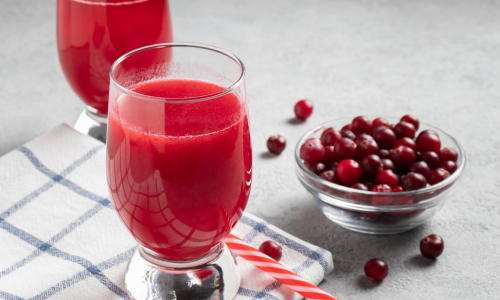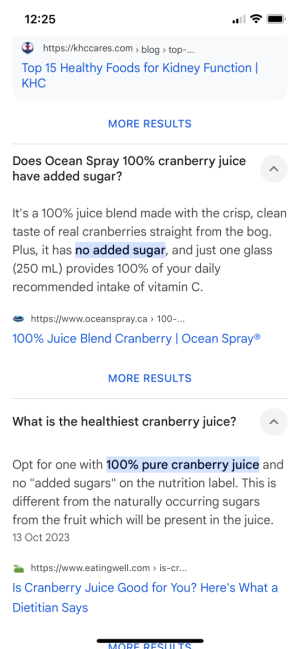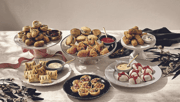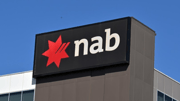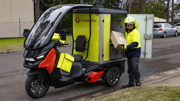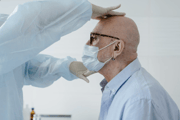Discover the Cancer-Fighting Superdrink Hiding in Your Fridge Right Now!
By
Gian T
- Replies 13
When we think of cranberry juice, our minds might wander to festive drinks or the classic remedy for a urinary tract infection. But what if this tart beverage held secrets beyond its tangy taste and vibrant colour? What if nestled among the bottles and cartons in your fridge, there was a super drink with the potential to combat a common and formidable enemy: cancer?
Recent research has brought to light the possibility that cranberry juice, a staple in many Australian households, could be a powerful ally in the fight against prostate cancer, the second most common cancer among men, trailing only behind skin cancer.
Prostate cancer affects a significant number of men, with estimates suggesting that roughly 12 per cent of those diagnosed may succumb to the disease. Standard treatments like surgery, radiation, or chemotherapy can be invasive and taxing on the body. Therefore, the idea of a natural dietary approach to potentially reduce the risk is both appealing and empowering.
The magic of cranberries lies in their rich composition of antioxidants and nutrients, including vitamin C, vitamin E, phosphorus, calcium, magnesium, potassium, and choline. These components have been shown to have various health benefits, and now, they're being linked to inhibiting the growth and spread of prostate cancer cells.
In a 2016 study, 32 men with prostate cancer were given powdered cranberries, which equated to roughly a 6-ounce glass of cranberry juice, for at least 21 days before undergoing surgery to remove prostate tumours. The results were promising: a reduction in blood levels of prostate-specific antigen (PSA), a marker often used to gauge the activity of prostate cancer.
While the PSA test's reliability has been debated, the decrease in PSA levels observed in these men could indicate that the cancer was less active. This finding aligns with laboratory studies, such as the 2012 research from the University of Prince Edward Island, which demonstrated that cranberries could reduce the amount of proteins called cyclins in prostate cancer cells. Cyclins are crucial for cancer growth and spread; without them, the cancer may become less aggressive or may not develop at all.
It's important to note that these studies were conducted in controlled environments, and the full effects of cranberries on prostate cancer in living humans are yet to be confirmed. However, the potential is too significant to ignore.
Beyond prostate cancer, cranberry juice has also been recognized for its antibacterial properties, particularly against H. Pylori bacteria, which is linked to stomach ulcers and an increased risk of stomach cancer. Regular consumption of cranberry juice might help reduce the risk of H. Pylori infection and, consequently, the risk of developing stomach cancer.
The journey of cranberries as a potential protector against prostate cancer began in the early 2000s, with a series of studies yielding similar results to the 2012 study. Despite the evidence being described as 'conflicting' by experts at Memorial Sloane Kettering Cancer Center, the door remains open for further exploration into the cancer-fighting properties of this humble fruit.
So, the next time you reach for a glass of cranberry juice, take a moment to appreciate the potential health benefits it may offer. While it's not a substitute for medical treatment, incorporating cranberry juice into a balanced diet could be a simple yet powerful step towards supporting your body's defences against cancer.
 We at the Seniors Discount Club encourage our readers to stay informed about the latest health research and to discuss any dietary changes with their healthcare providers. Have you experienced the health benefits of cranberry juice, or do you have a favorite way to enjoy this tart superdrink? Share your thoughts and tips in the comments below – your insights could be a beacon of health for someone else!
We at the Seniors Discount Club encourage our readers to stay informed about the latest health research and to discuss any dietary changes with their healthcare providers. Have you experienced the health benefits of cranberry juice, or do you have a favorite way to enjoy this tart superdrink? Share your thoughts and tips in the comments below – your insights could be a beacon of health for someone else!
Recent research has brought to light the possibility that cranberry juice, a staple in many Australian households, could be a powerful ally in the fight against prostate cancer, the second most common cancer among men, trailing only behind skin cancer.
Prostate cancer affects a significant number of men, with estimates suggesting that roughly 12 per cent of those diagnosed may succumb to the disease. Standard treatments like surgery, radiation, or chemotherapy can be invasive and taxing on the body. Therefore, the idea of a natural dietary approach to potentially reduce the risk is both appealing and empowering.
The magic of cranberries lies in their rich composition of antioxidants and nutrients, including vitamin C, vitamin E, phosphorus, calcium, magnesium, potassium, and choline. These components have been shown to have various health benefits, and now, they're being linked to inhibiting the growth and spread of prostate cancer cells.
In a 2016 study, 32 men with prostate cancer were given powdered cranberries, which equated to roughly a 6-ounce glass of cranberry juice, for at least 21 days before undergoing surgery to remove prostate tumours. The results were promising: a reduction in blood levels of prostate-specific antigen (PSA), a marker often used to gauge the activity of prostate cancer.
While the PSA test's reliability has been debated, the decrease in PSA levels observed in these men could indicate that the cancer was less active. This finding aligns with laboratory studies, such as the 2012 research from the University of Prince Edward Island, which demonstrated that cranberries could reduce the amount of proteins called cyclins in prostate cancer cells. Cyclins are crucial for cancer growth and spread; without them, the cancer may become less aggressive or may not develop at all.
It's important to note that these studies were conducted in controlled environments, and the full effects of cranberries on prostate cancer in living humans are yet to be confirmed. However, the potential is too significant to ignore.
Beyond prostate cancer, cranberry juice has also been recognized for its antibacterial properties, particularly against H. Pylori bacteria, which is linked to stomach ulcers and an increased risk of stomach cancer. Regular consumption of cranberry juice might help reduce the risk of H. Pylori infection and, consequently, the risk of developing stomach cancer.
The journey of cranberries as a potential protector against prostate cancer began in the early 2000s, with a series of studies yielding similar results to the 2012 study. Despite the evidence being described as 'conflicting' by experts at Memorial Sloane Kettering Cancer Center, the door remains open for further exploration into the cancer-fighting properties of this humble fruit.
So, the next time you reach for a glass of cranberry juice, take a moment to appreciate the potential health benefits it may offer. While it's not a substitute for medical treatment, incorporating cranberry juice into a balanced diet could be a simple yet powerful step towards supporting your body's defences against cancer.
Key Takeaways
- Research suggests that antioxidants and nutrients in cranberry juice may help fight against prostate cancer, a common cancer in men.
- Studies on animals and 2016 research on men with prostate cancer indicate that cranberries can reduce levels of prostate-specific antigen (PSA), potentially indicating less active cancer.
- Cranberries, and by extension cranberry juice, contain beneficial nutrients such as vitamin C, vitamin E, phosphorus, calcium, magnesium, potassium, and choline.
- There is evidence that cranberry intake may inhibit the growth and spread of prostate cancer cells, although the evidence is still conflicting, and more research is needed to fully confirm these effects in humans.

